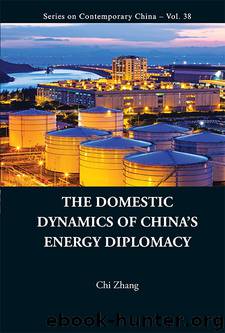Domestic Dynamics Of China's Energy Diplomacy, The by Zhang Chi

Author:Zhang, Chi
Language: eng
Format: epub
Publisher: World Scientific Publishing Company
5.2.1.6 The contribution of energy diplomacy to China’s energy security
Energy diplomacy improves China’s energy security conditions. Admittedly, energy diplomacy itself is unable to fundamentally eliminate the external threats listed above. But it contributes to China’s energy security in the following three ways:
First, energy diplomacy contributes to the diversification of China’s overseas energy suppliers. It helps China secure energy imports from not only the Middle East and Southeast Asia which are traditionally important regions exporting oil to China, but also Africa, Australia, Central Asia, Russia and Latin America which are relatively new and increasingly important energy suppliers for China. The energy import diversification drive is expected to reduce the proportion of oil from the Middle East in China’s overall oil import by raising that from other regions including Africa, Central Asia, Russia and Latin America; and alleviates the over-reliance of China’s energy import transportation on the Straits of Malacca, through which oil from the Middle East and Africa comes, by importing energy from Central Asia, Russia, Australia, Southeast Asia and Latin America. Hence, if one or two energy exporting regions suspend their oil exports to China for any reason, the other regions may still export oil to China; if the Straits of Malacca is blocked, energy imports through other shipping lanes and pipelines and railways may still reach China. Also, the diversification of China’s energy imports makes the potential placement of a comprehensive energy embargo against China more and more difficult and unlikely, as it is perhaps impossible to blockade all of China’s oil import routes.
Second, Chinese NOCs’ production of equity oil abroad increases the world’s total oil output as well as the oil supply to China. Chinese NOCs can develop some oil fields located in countries to which Western oil companies usually do not have access due to political reasons such as sanctions, unfavourable natural conditions, or have been abandoned by Western oil companies. Thus, the transnational operations of Chinese NOCs increase the overall amount of oil supply in the world. As Downs wrote, Chinese NOCs are actually increasing the amount of oil available to other oil importing countries through their operations overseas, especially through their development of oil fields that other oil companies are unable or unwilling to invest in.72 The growth of the world’s total oil output is beneficial for all oil importers including China, relieving their worries about the shortage of overseas oil supply.
Although Chinese NOCs do not send all of their overseas production of equity oil to China, their operation is helpful for global oil supply as well as China’s oil import security.73 Notably, not all of the equity oil produced by Chinese NOCs abroad is shipped back to China. They actually sell most of their equity oil produced abroad in the international market instead of sending it home, due to various economic reasons such as selling the oil for better prices on the world market, the oil may be more economically costly to be shipped back to China due to the long distance, that type of oil is not suitable to be refined in China, etc.
Download
This site does not store any files on its server. We only index and link to content provided by other sites. Please contact the content providers to delete copyright contents if any and email us, we'll remove relevant links or contents immediately.
International Integration of the Brazilian Economy by Elias C. Grivoyannis(110070)
The Radium Girls by Kate Moore(12018)
Turbulence by E. J. Noyes(8040)
Nudge - Improving Decisions about Health, Wealth, and Happiness by Thaler Sunstein(7692)
The Black Swan by Nassim Nicholas Taleb(7106)
Rich Dad Poor Dad by Robert T. Kiyosaki(6612)
Pioneering Portfolio Management by David F. Swensen(6288)
Man-made Catastrophes and Risk Information Concealment by Dmitry Chernov & Didier Sornette(6005)
Zero to One by Peter Thiel(5786)
Secrecy World by Jake Bernstein(4741)
Millionaire: The Philanderer, Gambler, and Duelist Who Invented Modern Finance by Janet Gleeson(4465)
The Age of Surveillance Capitalism by Shoshana Zuboff(4275)
Skin in the Game by Nassim Nicholas Taleb(4239)
The Money Culture by Michael Lewis(4198)
Bullshit Jobs by David Graeber(4179)
Skin in the Game: Hidden Asymmetries in Daily Life by Nassim Nicholas Taleb(3989)
The Dhandho Investor by Mohnish Pabrai(3759)
The Wisdom of Finance by Mihir Desai(3734)
Blockchain Basics by Daniel Drescher(3574)
